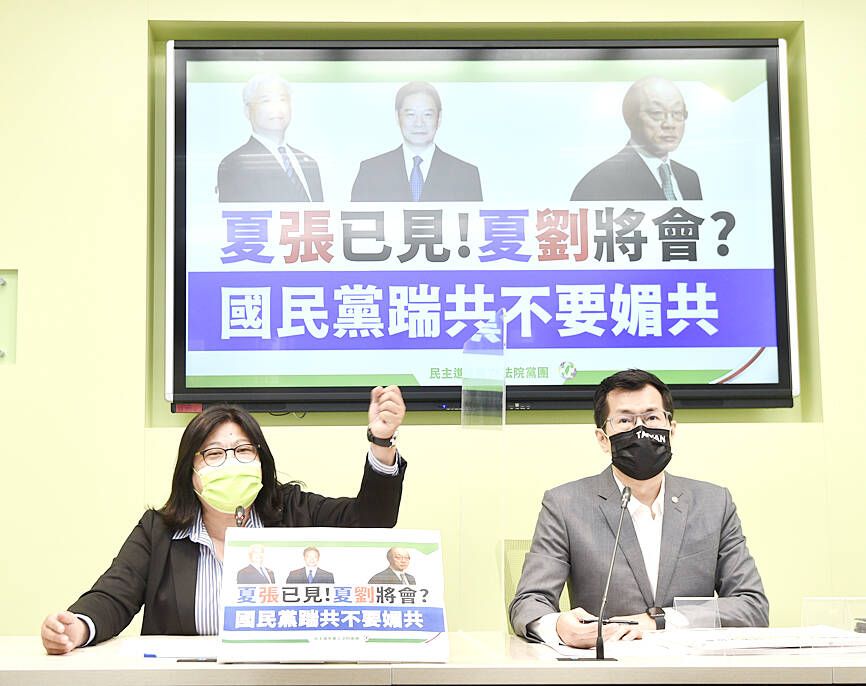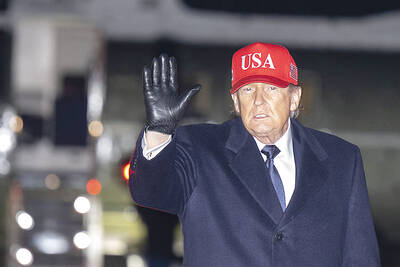As his China visit continued to spark controversy at home, the Chinese Nationalist Party (KMT) yesterday said that KMT Vice Chairman Andrew Hsia (夏立言) spoke up for Taiwan’s rights and received positive feedback during his meeting with China’s Taiwan Affairs Office (TAO) Vice Minister Chen Yuanfeng (陳元豐) on Thursday.
Hsia and his delegation left for China shortly after Beijing launched large-scale military exercises around Taiwan following a visit by US House of Representatives Speaker Nancy Pelosi.
Hsia dined with a delegation led by Chen in Shanghai, during which he also met with TAO Minister Zhang Zhijun (張志軍).

Photo: Lo Pei-te, Taipei Times
Chen said that tensions across the Taiwan Strait are a result of the Democratic Progressive Party’s (DPP) provocations and outside forces’ attempts to use Taiwan to contain China, China’s state-run Xinhua news agency reported.
He added that the “countermeasure” taken by China was “a legitimate and justified act,” it reported.
The Mainland Affairs Council in Taipei yesterday reiterated that it had tried to dissuade the KMT from visiting China at this time and that Taiwanese public opinion is strongly opposed to Chinese military threats.
It also protested China’s new round of military exercises in recent days, as well as Hsia’s delegation for failing to bring up the issue during talks with Chinese officials.
The KMT said that Hsia and Chinese officials discussed issues including human trafficking to Cambodia, the “early harvest list” of the Economic Cooperation Framework Agreement (ECFA), the “small three links” between China and Taiwan and the inspection and quarantine of agricultural products.
Beijing said it would provide assistance to Taiwanese stranded in Cambodia and welcomed the reopening of the “small three links,” the party said.
Unwilling to see that the strained relationship with Taiwan affects the ECFA or its early harvest list, China hopes to boost exchanges and collaborations with Taiwan in all aspects and bring prosperity to both sides of the Strait, it said.
Hsia said that he experienced firsthand the difficulty of traveling across the Strait during his trip, adding that he hoped both sides could maintain effective communication and work together toward peace and stability.
In Taipei, politicians continued to criticize his trip.
DPP caucus deputy secretary-general Wang Mei-hui (王美惠) said the KMT has no right to represent Taiwan in talks with China, and in doing so, Hsia has undermined Taiwan’s national interests.
“The KMT has lost power and is no longer the ruling party because the mainstream public do not agree with its political stance and policies,” Wang said. “Now it has turned to groveling, becoming subservient to China. In doing so, it has degraded the dignity of Taiwanese.”
DPP Legislator Chao Tien-lin (趙天麟) said that even before Hsia left for China, the trip had already drawn a strong reaction in Taiwan and abroad, so Hsia made a promise that the delegation “would not meet with high-ranking Chinese officials or discuss politics.”
However, “based on what has happened, people can no longer trust the KMT, as it once again broke its promises,” he said.
The Taiwan Statebuilding Party said in a news release: “As they [the delegation] are now visiting China, we have to ask Hsia and his KMT colleagues: Do you have the guts to tell Chinese officials that Taiwan does not belong to China?”
The statement said the KMT is conducting secret negotiations to sell out Taiwan, and that Hsia and his delegation are competing against other KMT officials to curry favor with Beijing, seeking to become proxy representatives for China.
Additional reporting by Chen Cheng-yu

Taiwan has received more than US$70 million in royalties as of the end of last year from developing the F-16V jet as countries worldwide purchase or upgrade to this popular model, government and military officials said on Saturday. Taiwan funded the development of the F-16V jet and ended up the sole investor as other countries withdrew from the program. Now the F-16V is increasingly popular and countries must pay Taiwan a percentage in royalties when they purchase new F-16V aircraft or upgrade older F-16 models. The next five years are expected to be the peak for these royalties, with Taiwan potentially earning

STAY IN YOUR LANE: As the US and Israel attack Iran, the ministry has warned China not to overstep by including Taiwanese citizens in its evacuation orders The Ministry of Foreign Affairs (MOFA) yesterday rebuked a statement by China’s embassy in Israel that it would evacuate Taiwanese holders of Chinese travel documents from Israel amid the latter’s escalating conflict with Iran. Tensions have risen across the Middle East in the wake of US and Israeli airstrikes on Iran beginning Saturday. China subsequently issued an evacuation notice for its citizens. In a news release, the Chinese embassy in Israel said holders of “Taiwan compatriot permits (台胞證)” issued to Taiwanese nationals by Chinese authorities for travel to China — could register for evacuation to Egypt. In Taipei, the ministry yesterday said Taiwan

‘LIKE-MINDED PARTNER’: Tako van Popta said it would be inappropriate to delay signing the deal with Taiwan because of China, adding he would promote the issue Canadian senators have stressed Taiwan’s importance for international trade and expressed enthusiasm for ensuring the Taiwan-Canada trade cooperation framework agreement is implemented this year. Representative to Canada Harry Tseng (曾厚仁) in an interview with the Central News Agency (CNA) said he was increasingly uneasy about Ottawa’s delays in signing the agreement, especially as Ottawa has warmed toward Beijing. There are “no negotiations left. Not only [is it] initialed, we have three versions of the text ready: English, French and Mandarin,” Tseng said. “That tells you how close we are to the final signature.” Tseng said that he hoped Canadian Prime Minister Mark Carney

The US’ joint strikes with Israel on Iran dismantled a key pillar of China’s regional strategy, removing an important piece in Beijing’s potential Taiwan Strait scenario, said Zineb Riboua, a senior researcher at the Hudson Institute’s Center for Middle East Peace and Security. In an article titled: “The Iran Question Is All About China,” Riboua said that understanding the Iran issue in the context of China’s “grand strategy” is essential to fully grasp the complexity of the situation. Beijing has spent billions of dollars over the years turning Iran into a “structural strategic asset,” diverting US military resources in the